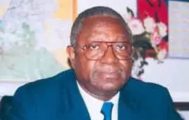Categories
Recent Posts
- Afrobeats star Davido says Nigerian culture is having a moment
- Football: Gabon forward Boupendza dies aged 28 in China
- Cameroonian youth urged to embrace hope despite multiple challenges
- Bishop of Bafoussam calls on voters to ‘make no mistake’ in this year’s election
- World Bank increases funding to Cameroon by 21%
Archives
- April 2025
- March 2025
- February 2025
- January 2025
- December 2024
- November 2024
- October 2024
- September 2024
- August 2024
- July 2024
- June 2024
- May 2024
- April 2024
- March 2024
- February 2024
- January 2024
- December 2023
- November 2023
- October 2023
- September 2023
- August 2023
- July 2023
- June 2023
- May 2023
- April 2023
- March 2023
- February 2023
- January 2023
- December 2022
- November 2022
- October 2022
- September 2022
- August 2022
- July 2022
- June 2022
- May 2022
- April 2022
- March 2022
- February 2022
- January 2022
- December 2021
- November 2021
- October 2021
- September 2021
- August 2021
- July 2021
- June 2021
- May 2021
- April 2021
- March 2021
- February 2021
- January 2021
- December 2020
- November 2020
- October 2020
- September 2020
- August 2020
- July 2020
- June 2020
- May 2020
- April 2020
- March 2020
- February 2020
- January 2020
- December 2019
- November 2019
- October 2019
- September 2019
- August 2019
- July 2019
- June 2019
- May 2019
- April 2019
- March 2019
- February 2019
- January 2019
- December 2018
- November 2018
- October 2018
- September 2018
- August 2018
- July 2018
- June 2018
- May 2018
- April 2018
- March 2018
- February 2018
- January 2018
- December 2017
- November 2017
- October 2017
- September 2017
- August 2017
- July 2017
- June 2017
- May 2017
- April 2017
- March 2017
- February 2017
- January 2017
- December 2016
- November 2016
- October 2016
- September 2016
- August 2016
- July 2016
- June 2016
Featured
 Burkina Faso: Where vision meets discipline
Burkina Faso: Where vision meets discipline  Prosecution of journalists in Cameroon: European Parliament says enough red flags have been ignored
Prosecution of journalists in Cameroon: European Parliament says enough red flags have been ignored  1982-2025: How long will Biya hang on?
1982-2025: How long will Biya hang on?  How Biya and Archbishop Nkea protected the sanctity of the family in Cameroon
How Biya and Archbishop Nkea protected the sanctity of the family in Cameroon  October Presidential Election: Will 92-year-old Biya be re-elected?
October Presidential Election: Will 92-year-old Biya be re-elected?
Most Commented Posts
 4 Anglophone detainees killed in Yaounde
4 Anglophone detainees killed in Yaounde
18 comments Chantal Biya says she will return to Cameroon if General Ivo Yenwo, Martin Belinga Eboutou and Ferdinand Ngoh Ngoh are sacked
Chantal Biya says she will return to Cameroon if General Ivo Yenwo, Martin Belinga Eboutou and Ferdinand Ngoh Ngoh are sacked
13 comments The Anglophone Problem – When Facts don’t Lie
The Anglophone Problem – When Facts don’t Lie
12 comments Anglophone Nationalism: Barrister Eyambe says “hidden plans are at work”
Anglophone Nationalism: Barrister Eyambe says “hidden plans are at work”
12 comments Largest wave of arrest by BIR in Bamenda
Largest wave of arrest by BIR in Bamenda
10 comments
Latest Tweets
Featured
-

Afrobeats star Davido says Nigerian culture is having a moment
-

Football: Gabon forward Boupendza dies aged 28 in China
-

Cameroonian youth urged to embrace hope despite multiple challenges
-

Bishop of Bafoussam calls on voters to ‘make no mistake’ in this year’s election
-

World Bank increases funding to Cameroon by 21%
-

Ukraine: Trump blames Zelensky for starting war after massive Russian attack
-

Minister Obi Eta Jerome’s death – What do we know?
© Cameroon Concord News 2025
9, September 2023
Chief Buthelezi, South Africa’s Inkatha leader, dies aged 95 0
Mangosuthu Buthelezi, the once-feared Zulu nationalist and historic leader of Inkatha Freedom Party (IFP) which presided over South Africa’s deadliest violence ahead of the first all-race elections, died Saturday aged 95, President Cyril Ramaphosa announced.
“I am deeply saddened to announce the passing of Prince Mangosuthu Buthelezi … Traditional Prime Minister to the Zulu Monarch and Nation, and the Founder and President Emeritus of the Inkatha Freedom Party,” Ramaphosa said in a statement.
“Prince Mangosuthu Buthelezi has been an outstanding leader in the political and cultural life of our nation, including the ebbs and flows of our liberation struggle, the transition which secured our freedom in 1994 and our democratic dispensation,” Ramaphosa said.
“He quietly and painlessly stepped into eternity in the early hours of the morning” Buthelezi’s family said in a statement.
Buthelezi, last week was discharged from hospital after a prolonged stay. Funeral arrangements have not yet been confirmed.
Born of royal blood on August 27, 1928, Mangosuthu Gatsha Buthelezi was to some the embodiment of the Zulu spirit: proud and feisty. To others, he bordered on a warlord.
For years he was defined by his bitter rivalry with South Africa’s ruling African National Congress (ANC), a party that was his political home until he broke away to form IFP in 1975.
He led the party from its inception, until the age of 90, a reign marked by bloody territorial battles with ANC supporters in black townships during the 1980s and 1990s that left thousands dead.
Founding father
The current IFP leader, Velenkosini Hlabisa, said in a statement that “as South Africa mourns, the IFP gives thanks –- even through our tears -– for the exceptional leader given to us for so many years. He blessed our country beyond measure. We cannot begin to express our gratitude.”
South Africa’s largest opposition party the Democratic Alliance said on X that South Africans had “have lost a founding father”.
As premier of the “independent” homeland of KwaZulu, a political creation of the apartheid government, Buthelezi was often regarded as an ally of the racist regime.
He was dogged by allegations of collaborating with the old government to fuel violence to derail the ANC’s liberation struggle — a claim he furiously denied.
The country’s second largest opposition party, the Economic Freedom Fighters (EFF) said in a statement that “his legacy will remain a debate in the South African political terrain for years to come”.
But the EFF commended him for managing “the realms of politics and the Zulu monarchy for decades”.
In the 1980s, the rift between his party and the ANC intensified as he distanced himself from the party and its anti-apartheid strategies, denounced by then-jailed Nelson Mandela as undermining the black leadership.
He also stirred the wrath of the liberation movements by calling for increased international investment in South Africa, opposing the call for sanctions to put pressure on the white government.
Thousands killed
Violence between Inkatha supporters and rival liberation groups escalated in the mid-1980s. By 1990 more than 5,000 people had been killed in clashes.
In 1991, Mandela and Buthelezi held talks and called for an end to the bloodshed.
But a year later, reports resurfaced of IFP-fomented violence, backed by apartheid security forces in Johannesburg and in the eastern Natal region.
A charismatic speaker with a heavy stutter, Buthelezi blamed the ANC for the unrest that threatened to become a full-blown civil conflict, which the apartheid government garishly referred to as “black-on-black” violence.
There was a new surge of unrest between ANC and IFP supporters in the run up to the first democratic elections in 1994, that claimed about 12,000 lives.
Long-serving politician
The violence largely dissipated after 1994, with Buthelezi appointed home affairs minister. He went on to become one of the longest-serving lawmakers.
Debilitated and barely able to walk, the once-feared leader stood hunched back and small, a shadow of his former self, peering at the crowd over his glasses perched on his nose, as he attended the Zulu annual reed dance in September 2022.
Source: AFP